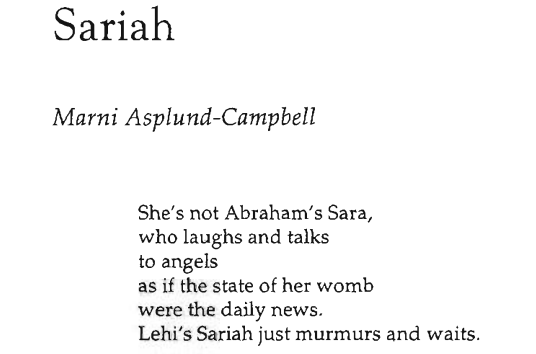Articles/Essays – Volume 27, No. 1
Sariah
She’s not Abraham’s Sara,
who laughs and talks
to angels
as if the state of her womb
were the daily news.
Lehi’s Sariah just murmurs and waits.
In Jerusalem, she sifts
through the pieces of her life:
the linen she wove for her wedding,
which was sturdy and coarse,
and now is smooth velvet from scrubbing.
Gold earrings from
Laman’s birth—they are
almost too heavy to wear, but
soft, and rich.
She packs green figs, wine,
bread, ties two goats,
and in her pocket
a silk bag of
ginseng, for there will be children,
long, painful labors.
She stays silent, drawing together only
these simplest things.
In the wilderness she thinks
that sons can be testaments,
and children bear the language
in their blood, the record from
their mothers,
and that nations dwindle only
when they are split open,
the words soaking red into the sand.
She attends her own birth,
a small son who comes reluctantly
while she pulls on a rope she has tied
between the tent poles,
baring her teeth.
So silent are God’s visions
that he must know Sariah, she assumes.
He will speak to her when he chooses,
and she will wait, saying nothing.


 Back to full Issue
Back to full Issue

